My Experience Doing The Carnivore Diet With Ehlers-Danlos Syndrome (Over 2 Years Later)
- Rachael Elizabeth
- Mar 8, 2024
- 17 min read
Updated: Jul 1, 2024

When I was in my early 20s, I became severely ill. I was diagnosed with many chronic illnesses including ehlers-danlos syndrome (hEDS), dysautonomia, chiari malfomation, craniocervical instability, gastroparesis, chronic lyme disease, and more. At my sickest, I was essentially bed-bound came close to needing a feeding tube.
For years, I went the western medicine route and tried all sorts of treatments including major neurosurgeries. We travelled to see "top doctors" and yet I continued to get sicker and sicker as the years passed. I began to realize if I was really going to get better, I had to look further than what modern medicine had to offer.
In 2021, I decided to give the carnivore diet a try after hearing of others having positive experiences with it. At this point, I had tried many other diets with little to no success (including vegetarian, paleo, gluten free, refined-sugar free, etc). I was very sick and malnourished at the time, and actually struggled to eat anything at all. I was close to needing a feeding tube.
Before starting carnivore, I spent about one month researching the diet (from bed), as I was really nervous it would make me worse. Unlike other diets I had researched, it seemed almost impossible to find a negative experience for the carnivore diet for all sorts of chronic conditions including autoimmune diseases, diabetes, heart disease, and even cancer. I spent a lot of time watching Dr. Ken Berry and Dr. Shawn Baker's videos on YouTube.
I couldn't find many people talking about carnivore with EDS, though. I scoured facebook groups and YouTube and found just a few people with ehlers-danlos syndrome sharing very positive experiences with the carnivore diet and decided I had to try it.
Looking back, I would have taken a bit more time easing into carnivore, but after a rough transition, it ended up being well worth it. Here's how I went about the transition:
Week 1: One meal a day carnivore (mostly beef), two meals not
Week 2: Two meals a day carnivore (mostly beef), one meal not
Week 3: Full carnivore (mostly beef)
When I started the carnivore diet, I was mostly bed-bound and needed help with cooking my meals (read more about my full story here). The transition was rough. I struggled with low blood sugar in the beginning and things did somewhat get worse before they got better. But I expected that.
To help mitigate the low blood sugar I experienced in the beginning, I had some raw honey whenever I felt lows coming on. This was very helpful, and after several weeks, I was able to wean off the honey completely.
Because I had such severe digestive symptoms at the time (nausea, pain, bloating, etc), I felt like I was force feeding myself. But I really, really wanted this diet to work for me and deep down I knew I needed to give it a good try.
I'm not going to sugar coat it, it was difficult! The first 4-6 weeks were the hardest. But with every bite I told myself this is going to be worth it, and I think that mindset really helped me through.
I decided to do a mostly beef diet, as my plan was to transition to the lion diet (all ruminant meat) after a while. When I started, I was eating about 90% beef and 10% chicken, pork, dairy, etc.
After about a month, I started seeing some slow and subtle improvements. I was gradually able to start cooking my own meals (while sitting in a chair), and could spend a few hours out of bed a day. The improvements were not nearly as fast as I'd hoped, but they were enough for me to keep going.
I noticed my fatigue crashes weren't quite as severe. I was in a little bit less pain. I was able to go to some family events. After spending years in bed, this progress was really exciting!
The diet began to help with my neck instability symptoms after about 2-3 months. When I started carnivore, I needed to wear my neck brace over 23 hours a day. I slowly needed it less and less. I truly believe my diet being so rich in collagen really helped to heal and strengthen my entire spine (and body)!
My improvements continued as the months went on, especially when it came to my chronic fatigue, chronic joint and muscle pain, and migraines. At about month three, I had gained 10-15lbs which was a huge milestone for me. Family and friends were starting to see a huge shift in me, and that was really exciting.
About 6 months into doing the carnivore diet, I had prolotherapy and neck curve correction treatments at Caring Medical in Florida. This was helpful for my instability as well, and I now see it as something that helped to accelerate my healing. I continued carnivore during those treatments and I actually think changing my diet beforehand may have prepared me for a better result with prolotherapy.
Looking back, I really do think it would have been possible to heal my cervical instability without the prolotherapy, as I only had the treatments on my neck, but my entire body has become SO much more stable and strong. That being said, I don't regret getting the treatments and am very grateful for the progress they brought me. I made a YouTube video sharing my thoughts on this in more detail.
At the one year carnivore mark was when I really started to notice huge improvements in my overall joint pain and stability related to EDS. My body was craving cuts of meat rich in connective tissue like chuck roast or oxtail. For a while there, I could eat almost an entire chuck roast in one sitting (and I'm fairly small, haha).
It's now been over 2.5 years since I started the carnivore diet in August of 2021. For 1.5 years, I did a "strict" carnivore diet where I ate nothing but animal products and salt (not even seasonings). Most of what I ate during that time was red meat or beef. Honestly, I don't know how much extra benefit going that strict brought me, but I don't regret doing it for a second.
For the past year or so, I've been doing more of an animal-based approach. I eat mostly meat, eggs, seafood, and dairy. But I also have added in fruit, raw honey, and some other whole foods. I've actually found that to be helpful! Something I've learned is that our bodies can have different needs at different times.
I still avoid ultra-processed foods, inflammatory oils (ex. vegetable oil, soybean oil, canola oil), and refined sugars.
While it was a struggle in the beginning, I now love the way I eat and don't at all feel restricted. I'm grateful every day for nourishing animal-based foods and the healing they have brought me. This is the way I want to be eating!
Below is a breakdown of my improvements I've seen with different symptoms and conditions related to EDS. Keep in mind, this is just my experience and thoughts. Always do what's best for you.
Chronic Fatigue
When I was at my sickest, I experienced severe fatigue. The kind of fatigue where it feels painful to roll over in bed or even lift up your arm. I also experienced fatigue crashes and PEM (post exertional malaise). I was never diagnosed with chronic fatigue syndrome, but I'm fairly sure I would have met the diagnostic criteria if I had been evaluated.
My fatigue was one of the first areas of improvement I noticed with carnivore. After 6 weeks or so, I very slowly was able to spend more and more time out of bed. And I could recover more quickly after overdoing it. Keep in mind, this was very gradual! Of course, we all want healing to happen overnight, but it takes time.
Now, I don't have fatigue crashes. I recover very quickly if I overdo it. And I don't need to spend ANY time in bed during the daytime. I live a normal and full life!

Mast Cell Reactions (MCAS)
Several months before starting the carnivore diet, I was getting hives all over my body everyday due to mast cell reactions. It's crazy to think that wasn't one of my most bothersome or concerning symptoms at the time.
Because of my mast cell reactions, I found it really helpful to eat unaged meat (most grocery store meat is aged, meaning its high in histamines). This wasn't cheap, but we looked at it like it was medicine and an investment in my health.
If that's not something you can afford, don't be discouraged. Lots of people are able to heal eating conventional meat. My first two months of carnivore, I ate only conventional meats, and saw significant progress with that. But I did notice a positive difference in how I felt when I switched to eating higher quality, pasture-raised meats.
After a few months of carnivore, I was no longer getting hives. My mast cell and histamine reactions weren't gone, but they were significantly improving.
For me, the most helpful things with my mast cell reactions was brain retraining and nervous system regulation. If you have MCAS, that a huge indicator that your nervous system is dysfunctional and you're stuck in survival mode (this is something that happens subconsciously by no fault of your own). Personally, I started with the DNRS Program, but there are many other great options such as Primal Trust or the Gupta Program. I have several other blog posts and videos sharing my experience with brain retraining.
I now no longer have MCAS and don't need to eat low histamine. I'm so grateful!

Neurological Symptoms & Migraines
My neurological symptoms were severe for years. Brain fog, migraines, weakness in my legs, tingling/nerve pain, non-epileptic seizures, difficulty walking, vertigo, etc.
These symptoms have gradually improved over the last 2.5 years and I am now almost symptom free. It truly feels like a miracle to go from completely debilitated with symptoms to healthy and living a normal life. Both diet and brain retraining have been key for these improvements.
Gastroparesis & Constipation
Constipation is something that I've struggled with for a long time, and actually haven't really talked about much (it feels hard to talk about, but it shouldn't be, haha). When I was really sick, it wasn't unusual for me to go 1-2 weeks without a bowel movement. I was sent to the ER several times for constipation. I tried all sorts of different medications, supplements, etc and they didn't work. I often tried enemas or those awful mag citrate bottles and even those usually didn't work for me. It was quite severe and very uncomfortable!
My gastroparesis caused pain and nausea when eating and I felt very full even after a few bites. Eating anything felt very difficult and I almost never felt hungry. I came very close to needing a feeding tube several times and was significantly underweight before starting carnivore.
I won't say carnivore completely fixed these things for me, but it did gradually start to improve over time. Especially with my ability to eat more, which helped me to gain some weight.
Also, most people that do carnivore actually find that removing fiber can be very helpful with chronic constipation. For me it definitely helped some, but I still struggled with this while doing carnivore and really needed to address my nervous system.
Honestly, I'd say the brain retraining work has been significantly more impactful for my recovery in terms of gastroparesis and constipation. Even if you're eating the perfect diet, if you have a dysfunctional nervous system stuck in survival mode, your digestion may still be impaired. Going into a parasympathetic "rest and digest" mode is so important for optimal digestion.
Now I have no gastroparesis symptoms, no stomach/intestinal pain, minimal bloating, no nausea, and minimal constipation. I have also gained close to 50lbs from my lowest weight!

Dysautonomia
My POTS / dysautonomia was very debilitating. I know there are lots of symptom overlap with all these conditions, but I'll focus on dizziness and ability to be upright in this section.
When I was at my sickest, I couldn't sit up or stand up for any amount of time without feeling dizzy and seriously unwell. The longest I could stand was about for 30 seconds or so. I often needed assistance to walk because I was so dizzy and unstable.
I no longer meet the diagnostic criteria for POTS. I don't experience dizziness when standing or that general feeling of being unwell. I can walk miles and exercise again.
The carnivore diet definitely helped me with this, but the biggest improvements for my dysautonomia came when I started brain retraining. And that makes sense because the definitional of dysautonomia is literally that you have a dysfunctional nervous system. I went from not being able to walk to my mailbox to being able to walk a mile in about a month of rewiring my brain. I'm so grateful for all the healing I've seen!
Joint Stability and Pain
My joint stability and overall chronic pain has improved so much since starting the carnivore diet. I used to experience full body muscle aches and joint pains. My ligaments were weak and prone to sprains and subluxations.
Over the last few years, I've really prioritized dietary collagen from home cooked meals. I drink a lot of meat stock and bone broth, which is very rich in collagen and connective tissue. In many ways, my joints feel stronger than I ever (even from before I got sick).
These improvements took longer to notice for me. It was around the year mark that I really started to see huge relief in my joint and body pains.
I am now able to regularly go rock climbing, hiking, and even went on a backpacking trip last year!

Skin Health
My skin health has greatly improved with my diet changes. I used to have stretchy, weak skin that was very prone to bruising, rashes, and sunburn. Now, my skin is strong and resilient! I don't bruise or sunburn very easily.
I actually have an blog post sharing more details about my skin health improvements.

Other EDS & Carnivore / Animal-Based Diet Testimonials
My story is just one of many. I've been surprised by how many people with EDS have sent me messages sharing incredible improvements in their health, joint stability, pain, and fatigue with doing a carnivore (or animal-based) diet. And believe it or not, I've heard from a few people with rarer types of EDS seeing healing with carnivore, too.
Eventually, I want to create more resources sharing EDS healing stories to encourage people (ex. interviews on youtube). As I feel hope is much needed in the EDS community.
For now, here are some testimonials I gathered from my community (several of these people are sharing their healing journey online):
Dr. Dawn Leighton -This is an interview with Dr. Shawn Baker sharing her experience doing the carnivore diet for her ehlers-danlos syndrome. After 6 months, she reported having no dislocations, very rare subluxations, and only experiencing 5% of the pain she was in before starting the diet. Incredible!
Mel Bell - Mel had very severe EDS, POTS, MALS, CCI / AAI, MCAS, chiari, and more and is now healing. She had a surgical feeding tube, and was told she'd eventually need to go on TPN, as she was struggling to tolerate her feeds so much. She worked with a nutritionist to very slowly start an animal-based diet and eventually had her feeding tube removed (and now is able to fully sustain herself). She literally started with 1/4 teaspoon of ground meat every three days and worked up slowly from there. She's continuing to see improvements in overall pain, energy levels, joint stability, and quality of life.
Becky - Becky has one of the most severe EDS stories I've ever heard of. She was unable to sit up, walk, or feed herself. Like me, she had several neurosurgeries, but continued to be severely ill. She's been doing a carnivore diet for over a year now and is seeing incredible healing and improvements.
Hailey - "I did strict carnivore for 6 weeks and was animal-based for about 10 months after that. I still focus on consuming animal products first and add other things alongside. It’s truly kinda hard to tell how much animal based helped with my joint stuff, because I feel like the LDN has made the biggest dent in that. However, animal-based has made a tremendous difference in my gut function/GI related problems. Such as—I’ve taken miralax every day since I was 16 years old. During that 6 weeks of strict carnivore, I didn’t need to take any. It was amazing! While I had to start taking it again when I added fiber back into my diet, I’m less dependent on it than I previously was, so I think that’s a huge testament to what animal-based can do!"
Amy - "How do I make an entire healing journey concise & a paragraph long? Well.... simply put meat & gratitude heals. When I started practicing gratitude at the very worst of my physical decline, it seemed like people were just magically put into my life to point me in the direction of what I needed to do to heal. If I had listened to doctors, I would be dead by now. I have Ehlers-Danlos Syndrome and at my worst, I was in a wheelchair from needing both knees replaced. I also have an adrenal insufficiency and was going to the ER multiple times a month due to adrenal crises. I had to do the work to get out of fight/flight/freeze mode... and I did it! I haven't been in an ER in over 4 years! 🤯 I didn't get my knees replaced and I have actually grown back cartilage. I can even somewhat run and skip! 🙌 I'm not the most graceful at it, but I'm just grateful to even be able to try. I've been a carnivore for 5 years now. I have added in some other whole foods, but my diet is 90% animal based."
Here are some screenshots of comments I've recently received from people sharing their experience with carnivore for EDS:
Is an animal-based or carnivore diet right for everyone with EDS?
When it comes to diet, people often say things like "we're all so different". And while I agree to some degree, I think we have more in common than we're lead to believe.
Humans thrive eating animal protein and fat, it is truly the most bioavailable nutrition available for us. That being said, I don't think its always necessary to do a strict carnivore or animal-based diet. Many people have reached out to me asking if they have to be super strict to see benefits from adding in more meat into their diet. Of course not! In general, the more meat and the less ultra-processed foods you eat, the better your health will be. It doesn't have to be all or nothing.
But at the end of the day, only you can figure out what's best for you!
What if you struggle to digest red meat?
If you struggle to digest nutrient dense foods such as red meat, it's likely your nervous system is stuck in survival mode (this greatly affects digestion). Personally, when I was really sick, I struggled to digest any food, including red meat. This got better in time.
Low stomach acid is also a common problem that can cause difficulty digesting meat (and other foods). Regulating your nervous system and getting back into a parasympathetic "rest and digest" mode can really help with this. For me, the most beneficial thing for my food reactions and digestion issues has been brain retraining—even though the carnivore diet did help with this too.
What did your doctors think about you going carnivore?
Unfortunately, I didn't have any doctors guiding me when I started carnivore. At the time, my main doctor was not keen on it, but didn't give me too much trouble about it. I purposefully avoided talking about it or brining it up.
In the beginning, this felt scary, because I was so sick. It would have been really helpful to have some sort of professional guidance, but this is something I had to do on my own and with the support of my family. Even though it wasn't easy, I'm so glad I did.
I went the western medicine route for years and only continued to get sicker. Before going carnivore I was being recommended more neurosurgeries, but deep down I knew it wasn't the answer. None of the treatments or surgeries I had in the past got me better, why would this one be different? Honestly, I don't know if I'd be alive today if I continued going down that path.
Please keep in mind that I'm not saying doctors and our medical system don't have a place. They do, especially in acute situations. But they really are failing most chronic illness patients, and in many circumstances (like my own experience) can they do more harm than good.
One of the biggest things I've learned over the past few years is that I can make decisions for my health without a doctor telling me it's okay or not. I know my body best and am allowed to question something a doctor tells me or have a different viewpoint. In order to start to heal, I had to take control of my health. This was scary at first, but has become very empowering. See one of my recent instagram posts for more thoughts on this.
If you're looking for a doctor that's supportive of carnivore, I believe Dr. Shawn Baker is putting together a network of doctors (called Revero) that are familiar with the carnivore diet. That may be something to look into if you're wanting to try carnivore. It's definitely grown in popularity since I started it, and there are more doctors that are getting on board—but I'm guessing you'd still have to search specifically to find a doctor supportive of carnivore.
Are there any book / resources you'd recommend to learn more?
Yes! Here are some book's I'd recommend:
Deep Nutrition by Dr. Cate Shanahan
This book is excellent and very data driven. It has a section about connective tissue disorders and why dietary collagen (ex. homemade broths and soups) is so important for our joint and skin health. It discusses how our genes can change/adapt through generations given our nutritional status.
Gut & Physiology Syndrome by Dr. Natasha McBride
This also has a great section on connective tissue disorders. Just be careful when reading it not to feel overwhelmed by all the lifestyle changes she recommends. Go slow and at your own pace. Stressing about toxins is worse than the toxins themselves.
The Sacred Cow by Diana Rogers
This is really helpful for those that struggle with the ethical side of eating meat. My viewpoint on this has significantly changed over the last few years and I now believe eating meat is both good for our health and the environment, especially when regeneratively raised.
YouTube Channels:
Dr. Ken Berry (he was my main source of inspiration for starting carnivore)
Dr. Anthony Chaffee
Dr. Shawn Baker
Sally Norton
Do you think you even had EDS? Could you have been misdiagnosed?
Good question! I was diagnosed by a geneticist and had hEDS just as much as anyone that's diagnosed with it has it. And I was actually quite a severe case.
Personally I see hEDS as a collection of symptoms that doctors can't explain. Yet they label it as genetic and incurable. Which I don't think is right, because they don't know that. And there are people recovering.
EDS is becoming very common now and I truly think a huge reason is poor nutritional status. When you don't fuel the body right, it has a tendency to fall apart!
I know this will be triggering for some people to read, and I understand that. I'm not at all invalidating your experience with illness or your symptoms. They are very real! I know what it's like to be completely debilitated with chronic illness, and don't want anyone to have to live that way. There is so much hope for healing.
Many people find that in order to begin healing from EDS, they have to stop identifying with that diagnosis. It's difficult to heal from something you identify with.
There will be people that disagree with the message I share (and that's okay), but I wholeheartedly believe healing from EDS is possible. Just one person healing means it's possible. And I'm certainly not the only one healing!
In Conclusion
I'm so grateful for the progress doing an animal-based/carnivore diet has brought me over these past few years. It certainly wasn't easy in the beginning, but it helped save my life and has brought me so much healing.
Within the EDS community, there's a notion that eating dietary collagen can't help because your collagen is just "faulty". I can't disagree with this more—I've seen dietary collagen help too many people with EDS to deny that its important. I'm not talking processed collagen powders and supplements, but home cooked meals with meats rich in connective tissue (ex. bone broth, chuck roast, oxtail, soup, etc).
EDS is said to be genetic and incurable, but I was once on the severe end of the spectrum and now don't even meet the diagnostic criteria. I'm not the only one healing, either.
Keep in mind, genetic expression can change given your nutritional state, nervous system state, and environment. The Spero Clinic does a great job of explaining that in this blog post. EDS truly is just a list of symptoms doctors cannot explain, and I don't believe its right they tell those people they will be sick for the rest of their lives. Just because they may not have the tools to help people heal doesn't mean it isn't possible.
While this blog post is focused on my experience and improvements from carnivore, I think its important to mention that brain retraining and nervous system regulation have been just as important for my healing as changing my diet. I started brain retraining about 8 months after starting carnivore and I believe the combination of both really accelerated my recovery. I went from bed-bound and essentially dying to now living a normal life! I can't be more grateful.
I will plan on making another post about EDS and nervous system regulation / brain retraining, as I feel this is such a key element for recovery.
If you or one of your loved ones has EDS, I hope you know you're not alone. I'm rooting for you and praying for you. There is so much hope for healing. Keep believing that life can and will get better.
P.S. I have lots more content about my healing journey on instagram and my youtube channels (@RibeyeRach & @HealingWithRachael). Thank you so much for visiting my blog!


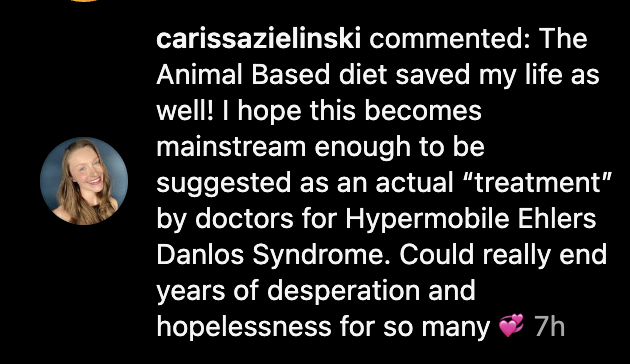

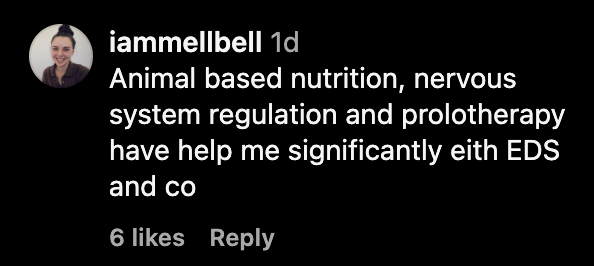


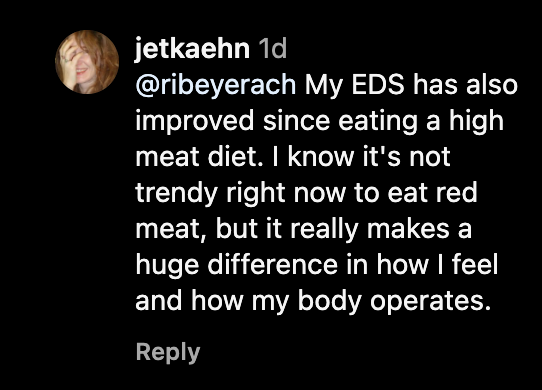



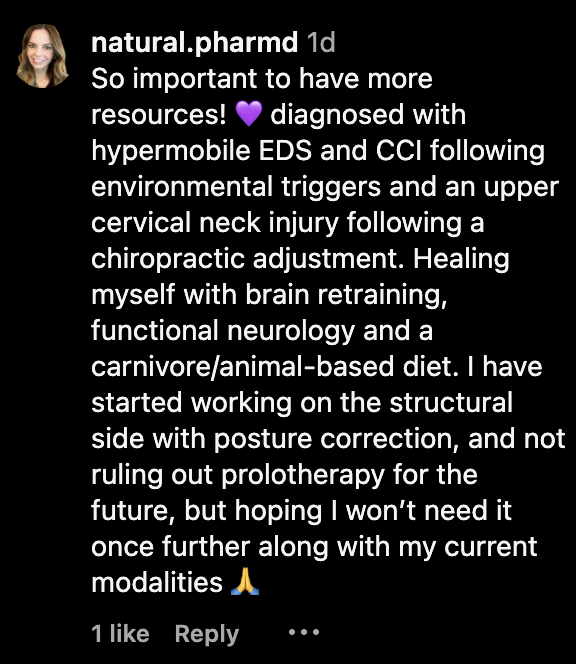

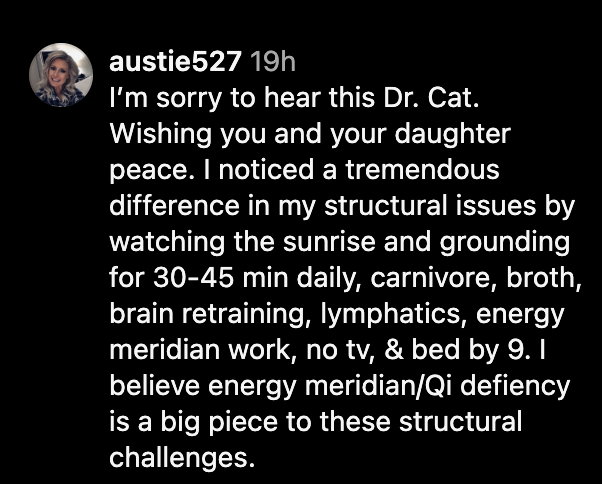
What is brain retraining?
Hi Rachael! You are an inspiration!! I'm very happy for you and very grateful that you had the guts to share that the carnivore diet worked for you publicly. I have a question: Have you read Grant Genereux book on Vitamin A (excess) causing all sorts of problems that people solve with carnivore (carnivore but without liver, which is high in VitA). Autoimmune issues, skin issues, bone, joints, etc. I wonder if there is an overlap, and what is your opinion? Also Garrett Smith made videos on the topic (as Nutrition Detective). I really would like to know your opinion, (as an hypermobile with a few symptoms that is getting better in every respect with a kind of carnivore but no…